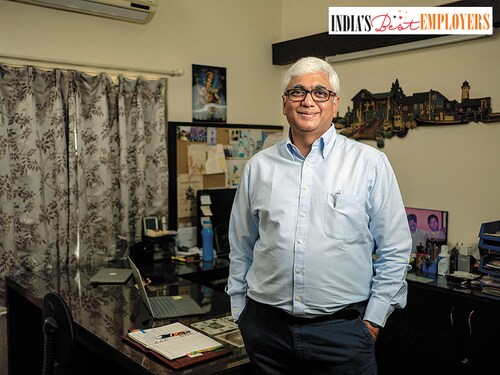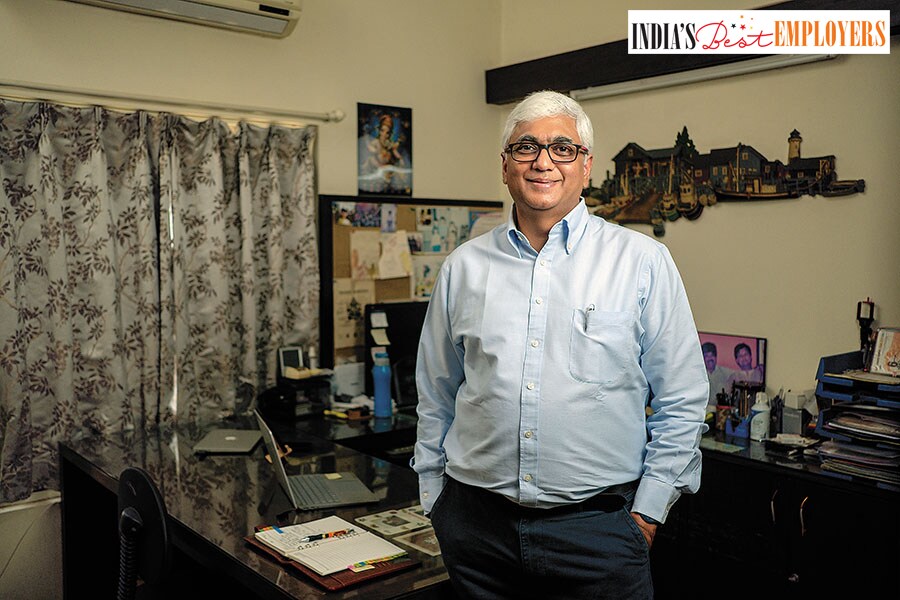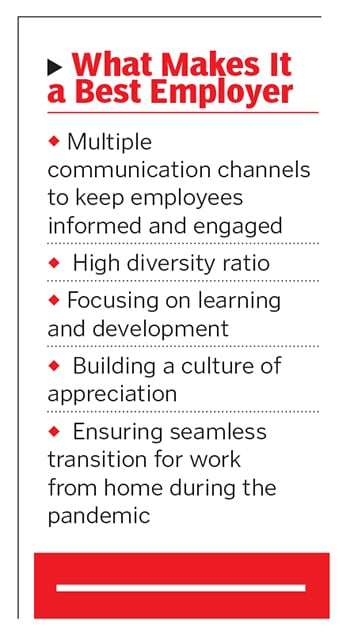India's Best Employers: How Allstate India put people before policies
Allstate India ensured communication and engagement, transparency and financial support to help employees cope with challenges posed by the pandemic


 Allstate India MD Chetan Garga maintains an open-door policy to communicate with employees
Allstate India MD Chetan Garga maintains an open-door policy to communicate with employees
Image: Nishant Ratnakar for Forbes India[br] As the country went into a lockdown last March, it was easy enough for employees with laptops at Allstate India to switch over to work from home—they did this on and off in any case.
But switching an employee base of about 1,800 who worked on desktops from office was a challenge—shipping the desktops, some of them with dual screens, to their homes, ensuring good internet connectivity, and in some cases even uninterrupted power–and the first thing they did, says Chetan Garga, managing director at Allstate India, was to try and bring a bit of calm in the initial chaos for their 5,000 staffers spread across Bengaluru and Pune.
“We wanted people to realise we are all in this together so we have to find ways to handle this together,” says Garga. To this end, they ensured there was communication and engagement. A central team called the Critical Incident and Response Team was set up to handle everything from answering questions and allaying fears to helping with the support needed for work from home.
Allstate India is a subsidiary of and business services arm for insurance firm Allstate Inc, one of the largest companies in the US by revenue—in 2020, it reported $45 billion in revenue with $5.5 billion in net earnings.
When the pandemic hit, Allstate India took a call to provide internet reimbursement, a one-time payment of ₹25,000 for work from home support, and towards the end of last year, also Covid-19 support, creating a fund to help employees cover costs over and above what insurance paid for. It was a conscious effort to take quick decisions. “We needed to be patient but also be decisive,” says Garga. Which meant ensuring that policies and getting all the tick marks and consents on them did not slow them down. “Recognising everybody has unique situations and supporting them in that allows us to put people before policies,” says Garga.It helped in a seamless transition. “During Covid, we observed that they seamlessly transitioned all their 5K-plus employees to work from home, ensuring employee safety,” says Kamal Karanth, co-founder of specialist staffing company Xpheno.
In the midst of all the uncertainty, the company also ensured there was transparency—towards both employees and stakeholders.
“Transparency was really important, bad news, good news, this is where we stand,” says Garga. They clearly communicated to employees that there would be no layoffs due to the pandemic. Besides, the company did a daily call for updates, a weekly leadership call, as well as ‘open box sessions’ with a mix of employees across levels, “without any prescribed agenda, but to answer questions, see how their families are doing, what new skills they have learnt, how they are managing on their mental health side, sharing experiences, how are other managers doing, so that it all becomes real to everyone”, says Garga.
Communication and engagement have been an ongoing thing at Allstate India, and Karanth points out that their strength comes from the multiple communication channels that keep employees informed and engaged. Garga, 55, who has been with the company since it started in December 2012, maintains an open-door policy so employees are encouraged to drop in, and when he’s in office, floor talks—“just walk to different sections, chat with people, see what’s going on, that’s a very informal way of getting to know how people are doing and breaking hierarchies,”—are common.
While the average age of employees in operations is 23-24 and in the technology department is 27-28, their semi-annual employee surveys reveal that most employees have the same concerns and requirements irrespective of age—“career development, they want to learn more, they want to be recognised, and they want guidance and coaching. And we are gearing up our programmes, policies and interventions also in that direction”, says Garga. The company has programmes for people to upskill and also pays for certifications up to a certain limit. Besides, through internal job postings, both vertical progression and lateral movements are encouraged.
[qt]Their diversity ratio is pretty high for a tech company... it’s in the range of 40 percent, which is pretty good.”
Kamal Karanth, Co-founder, Xpheno[/qt]
Women make up about 40 percent of the workforce, something that has happened naturally, though they have been working on being more inclusive about the physically challenged, and inclusiveness of the LGBTQ+ community is also on the agenda. “Their diversity ratio is pretty high for a tech company… it’s in the range of 40 percent, even leadership levels they have 35 percent, which is pretty good,” says Karanth.
Besides the type of work involved, one of the things that makes the company attractive to women is also the fact that they transport all their employees to work and back home. “That itself becomes a big attraction, especially for women employees. So I think some of our policies are geared such that they make it more comfortable for a wider segment of population,” says Garga.
First Published: Mar 17, 2021, 15:15
Subscribe Now